牛津译林版(2019)必修 第三册 Unit 2 Natural disasters Integrated skills课件(19张PPT)
文档属性
| 名称 | 牛津译林版(2019)必修 第三册 Unit 2 Natural disasters Integrated skills课件(19张PPT) |
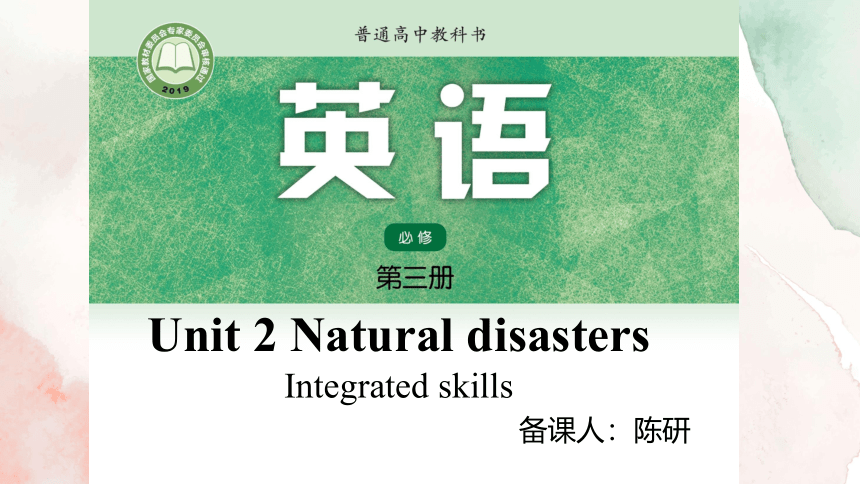
|
|
| 格式 | pptx | ||
| 文件大小 | 13.2MB | ||
| 资源类型 | 教案 | ||
| 版本资源 | 牛津译林版(2019) | ||
| 科目 | 英语 | ||
| 更新时间 | 2023-03-07 14:29:37 | ||
图片预览

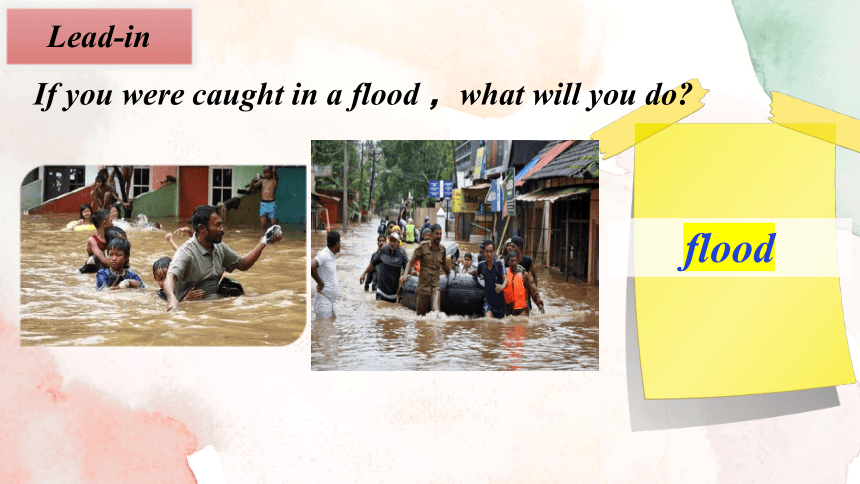
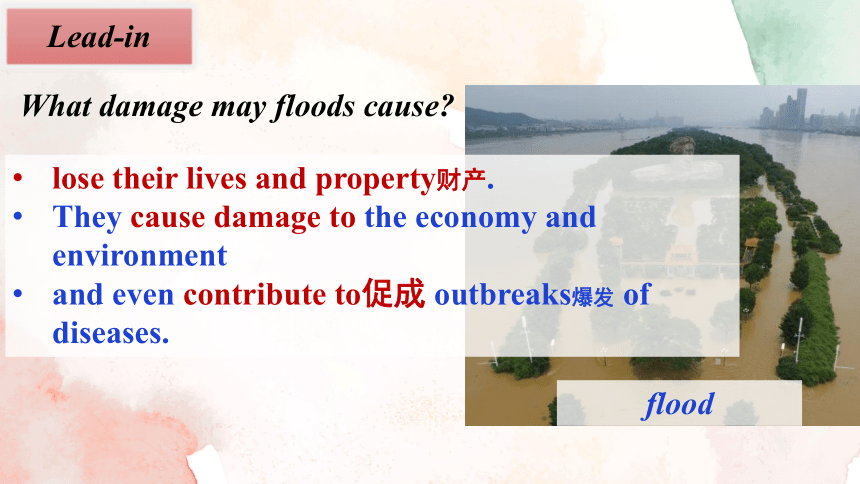
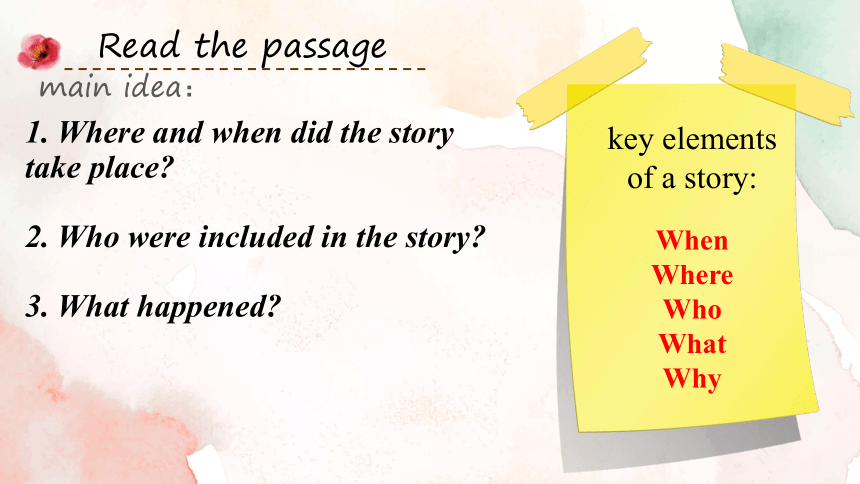
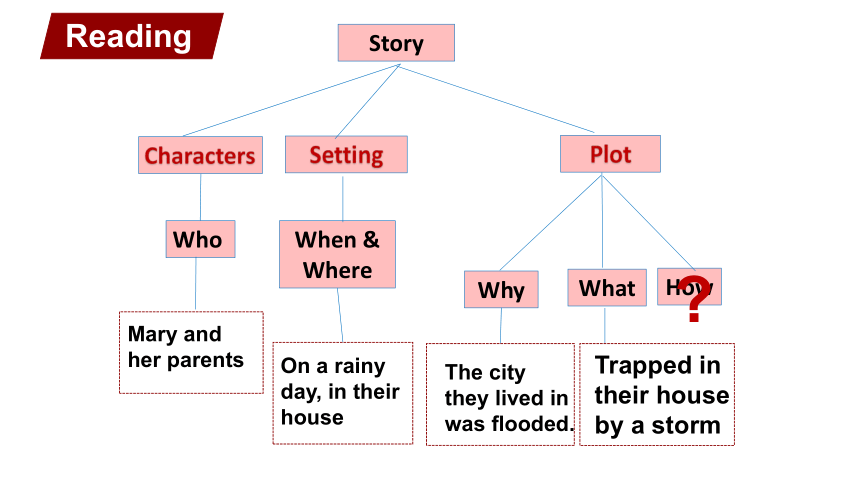
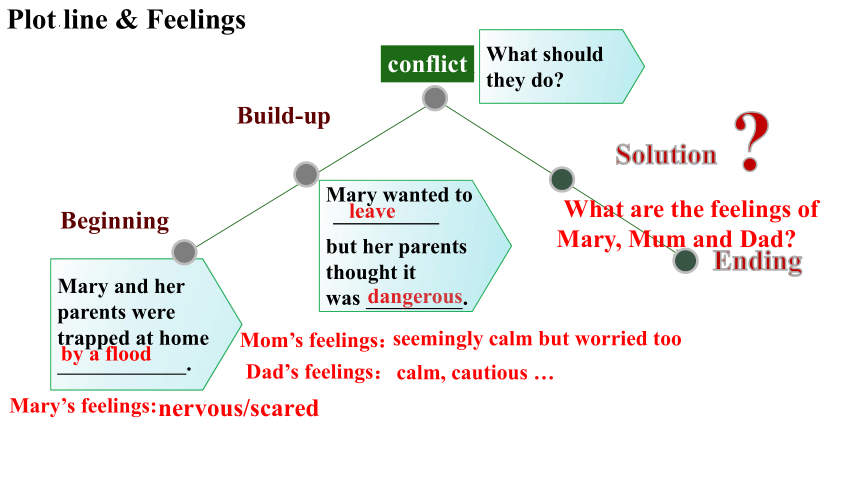
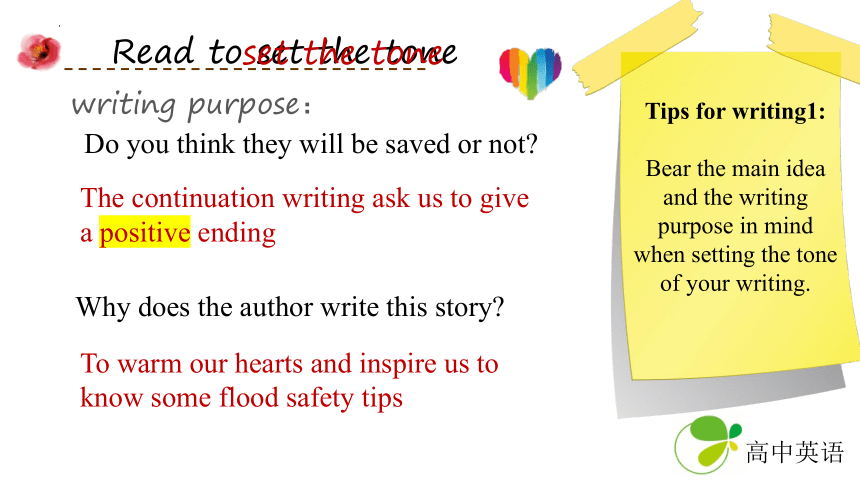
文档简介
(共19张PPT)
Unit 2 Natural disasters
Integrated skills
备课人:陈研
Lead-in
flood
If you were caught in a flood ,what will you do
Lead-in
flood
What damage may floods cause
lose their lives and property财产.
They cause damage to the economy and environment
and even contribute to促成 outbreaks爆发 of diseases.
main idea:
key elements
of a story:
When
Where
Who
What
Why
1. Where and when did the story take place
2. Who were included in the story
3. What happened
Read the passage
Story
Plot
Why
What
How
Who
When & Where
Setting
Characters
Reading
Mary and her parents
On a rainy day, in their house
Trapped in their house by a storm
The city
they lived in was flooded.
Mary and her parents were trapped at home
.
by a flood
dangerous
leave
Beginning
Build-up
Solution
climax
What should they do
conflict
Ending
Plot line & Feelings
seemingly calm but worried too
nervous/scared
Mary’s feelings:
Mom’s feelings:
What are the feelings of Mary, Mum and Dad
Mary wanted to l
but her parents thought it was .
Dad’s feelings:
calm, cautious …
Tips for writing1:
Bear the main idea and the writing purpose in mind when setting the tone of your writing.
Do you think they will be saved or not
Read to set the tone
Why does the author write this story
To warm our hearts and inspire us to know some flood safety tips
writing purpose:
set the tone
The continuation writing ask us to give a positive ending
Leave home
Stay home
What can they do to save themselves
What safety tips can be used to protect themselves
Moving to the upper floor if you are already inside a building.
Keep informed of the situation
Don’t walk or drive through the moving floodwater.
Prepare disaster supplies
1.The outside is very
dangerous.
1.The flood would
become severe.
2.In the house, there
are plenty of supplies..
2.The windows and door
of the house can’t
prevent the flood .
Work in groups
Discussion
Volunteers
Soldiers
Neighbors
Will any new characters appear
stay informed on local news
prepare an emergency bag with food, drugs...
know how to get to safety places
leave before flooding starts
keep useful items at home(sandbags,
rope...)
turn off the power
don't walk or drive in flood water
get to a higher ground
follow evacuation orders
lead animals to a safer place
Analyse the emotions
Dad:
nervous, scared, curious …
seemingly calm, worried, cautious …
calm, cautious …
Mary:
Mum:
Will there be any emotional changes
Planning
Language
“Mum, Dad,” said Mary suddenly, “I think we should leave here right away!”
“No,” said Dad. “It’s too late! The radio says the city has already been flooded.”
“We can drive our car through the floodwater! Let’s just leave! I’m really scared!” cried Mary.
“We can’t do that, honey,” explained Mum, “otherwise the moving water could wash the car away.”
“Don’t open the door!” shouted Mum and Dad at the same time. “The water may flood in!”
“Mary, don’t worry. Everything’s going to be OK,” she said softly, trying her best to comfort Mary. Her voice was calm, but Mary could tell she was worried too.
Planning
Language
Dialogue is important in a story.
Emotion
Move the plot forward
Reveal a character’s personality.
“Don’t open the door!” shouted Mum and Dad at the same time. “The water may flood in!”
Example
Anxious, worried
Considerable, experienced
They may stay at home
Dialogue is usually placed inside quotation marks.
Planning
Language
More specific words to replace say
cry, explain, shout, scream, yell, roar, whisper, add, continue, remark, repeat, complain, warn, reply, apologize, comfort, beg, refuse, answer, cheer …
According to the needs of storyline and emotions of characters
Tips for writing2:
Dialogues
Emotions
Caught in a flood
(Part II)
After a brief discussion, Mum and Dad made a decision.
Finally, the rain stopped.
Two given beginnings
Solution:
Ending:
What would be the decision What would they do
What happened at last
Write your story!
Self-review
Does your writing match the first half of the story in terms of characters and content
Do you use dialogue in your writing
Polish your language
Tips for writing3:
Make sure the tense is consistent with (与…一致) the given material.
After a brief discussion, Mum and Dad made a decision.
Finally, the rain stopped.
Simple Past
Writing
Caught in a flood
(Part II)
After a brief discussion, Mum and Dad decided they should stay in the house. They thought it would be really dangerous to try to walk through the water to get to higher ground.
“Mary, we’ll have to go upstairs and wait there,” said Mum.
“OK, Mum. If that’s what you think is best,” Mary replied uncertainly.
So they went upstairs and waited. Downstairs, water flooding into the living room and kitchen. All three of them were nervous, but at least they had disaster supplies, including food and drinking water.
Sentence to make connection with first half
Trust because of Mum’s considerate personality
New idea for moving plot
Match the first half of the story (contents)
Writing
Finally, the rain stopped, but Mary and her family could not leave while the house was still flooded. They listened to the radio and learnt that rescue workers in boats were coming to rescue people who were trapped in their homes. They waited for a boat to arrive at their house. Their home had been badly damaged, but they were all happy to be alive.
Leading sentence
Match the first half of the story (contents)
New character for moving the plot
Ending (setting, emotion, event)
Homework
1. Do your continuation writing;
2. 完成报纸;
3. 完成不定式的语法资料
Unit 2 Natural disasters
Integrated skills
备课人:陈研
Lead-in
flood
If you were caught in a flood ,what will you do
Lead-in
flood
What damage may floods cause
lose their lives and property财产.
They cause damage to the economy and environment
and even contribute to促成 outbreaks爆发 of diseases.
main idea:
key elements
of a story:
When
Where
Who
What
Why
1. Where and when did the story take place
2. Who were included in the story
3. What happened
Read the passage
Story
Plot
Why
What
How
Who
When & Where
Setting
Characters
Reading
Mary and her parents
On a rainy day, in their house
Trapped in their house by a storm
The city
they lived in was flooded.
Mary and her parents were trapped at home
.
by a flood
dangerous
leave
Beginning
Build-up
Solution
climax
What should they do
conflict
Ending
Plot line & Feelings
seemingly calm but worried too
nervous/scared
Mary’s feelings:
Mom’s feelings:
What are the feelings of Mary, Mum and Dad
Mary wanted to l
but her parents thought it was .
Dad’s feelings:
calm, cautious …
Tips for writing1:
Bear the main idea and the writing purpose in mind when setting the tone of your writing.
Do you think they will be saved or not
Read to set the tone
Why does the author write this story
To warm our hearts and inspire us to know some flood safety tips
writing purpose:
set the tone
The continuation writing ask us to give a positive ending
Leave home
Stay home
What can they do to save themselves
What safety tips can be used to protect themselves
Moving to the upper floor if you are already inside a building.
Keep informed of the situation
Don’t walk or drive through the moving floodwater.
Prepare disaster supplies
1.The outside is very
dangerous.
1.The flood would
become severe.
2.In the house, there
are plenty of supplies..
2.The windows and door
of the house can’t
prevent the flood .
Work in groups
Discussion
Volunteers
Soldiers
Neighbors
Will any new characters appear
stay informed on local news
prepare an emergency bag with food, drugs...
know how to get to safety places
leave before flooding starts
keep useful items at home(sandbags,
rope...)
turn off the power
don't walk or drive in flood water
get to a higher ground
follow evacuation orders
lead animals to a safer place
Analyse the emotions
Dad:
nervous, scared, curious …
seemingly calm, worried, cautious …
calm, cautious …
Mary:
Mum:
Will there be any emotional changes
Planning
Language
“Mum, Dad,” said Mary suddenly, “I think we should leave here right away!”
“No,” said Dad. “It’s too late! The radio says the city has already been flooded.”
“We can drive our car through the floodwater! Let’s just leave! I’m really scared!” cried Mary.
“We can’t do that, honey,” explained Mum, “otherwise the moving water could wash the car away.”
“Don’t open the door!” shouted Mum and Dad at the same time. “The water may flood in!”
“Mary, don’t worry. Everything’s going to be OK,” she said softly, trying her best to comfort Mary. Her voice was calm, but Mary could tell she was worried too.
Planning
Language
Dialogue is important in a story.
Emotion
Move the plot forward
Reveal a character’s personality.
“Don’t open the door!” shouted Mum and Dad at the same time. “The water may flood in!”
Example
Anxious, worried
Considerable, experienced
They may stay at home
Dialogue is usually placed inside quotation marks.
Planning
Language
More specific words to replace say
cry, explain, shout, scream, yell, roar, whisper, add, continue, remark, repeat, complain, warn, reply, apologize, comfort, beg, refuse, answer, cheer …
According to the needs of storyline and emotions of characters
Tips for writing2:
Dialogues
Emotions
Caught in a flood
(Part II)
After a brief discussion, Mum and Dad made a decision.
Finally, the rain stopped.
Two given beginnings
Solution:
Ending:
What would be the decision What would they do
What happened at last
Write your story!
Self-review
Does your writing match the first half of the story in terms of characters and content
Do you use dialogue in your writing
Polish your language
Tips for writing3:
Make sure the tense is consistent with (与…一致) the given material.
After a brief discussion, Mum and Dad made a decision.
Finally, the rain stopped.
Simple Past
Writing
Caught in a flood
(Part II)
After a brief discussion, Mum and Dad decided they should stay in the house. They thought it would be really dangerous to try to walk through the water to get to higher ground.
“Mary, we’ll have to go upstairs and wait there,” said Mum.
“OK, Mum. If that’s what you think is best,” Mary replied uncertainly.
So they went upstairs and waited. Downstairs, water flooding into the living room and kitchen. All three of them were nervous, but at least they had disaster supplies, including food and drinking water.
Sentence to make connection with first half
Trust because of Mum’s considerate personality
New idea for moving plot
Match the first half of the story (contents)
Writing
Finally, the rain stopped, but Mary and her family could not leave while the house was still flooded. They listened to the radio and learnt that rescue workers in boats were coming to rescue people who were trapped in their homes. They waited for a boat to arrive at their house. Their home had been badly damaged, but they were all happy to be alive.
Leading sentence
Match the first half of the story (contents)
New character for moving the plot
Ending (setting, emotion, event)
Homework
1. Do your continuation writing;
2. 完成报纸;
3. 完成不定式的语法资料
同课章节目录
- Unit 1 Nature in the balance
- Welcome to the unit
- Reading
- Grammar and usage
- Integrated skills
- Extended reading
- Project
- Unit 2 Natural disasters
- Welcome to the unit
- Reading
- Grammar and usage
- Integrated skills
- Extended reading
- Project
- Unit 3 The world online
- Welcome to the unit
- Reading
- Grammar and usage
- Integrated skills
- Extended reading
- Project
- Unit 4 Scientists who changed the world
- Welcome to the unit
- Reading
- Grammar and usage
- Integrated skills
- Extended reading
- Project
